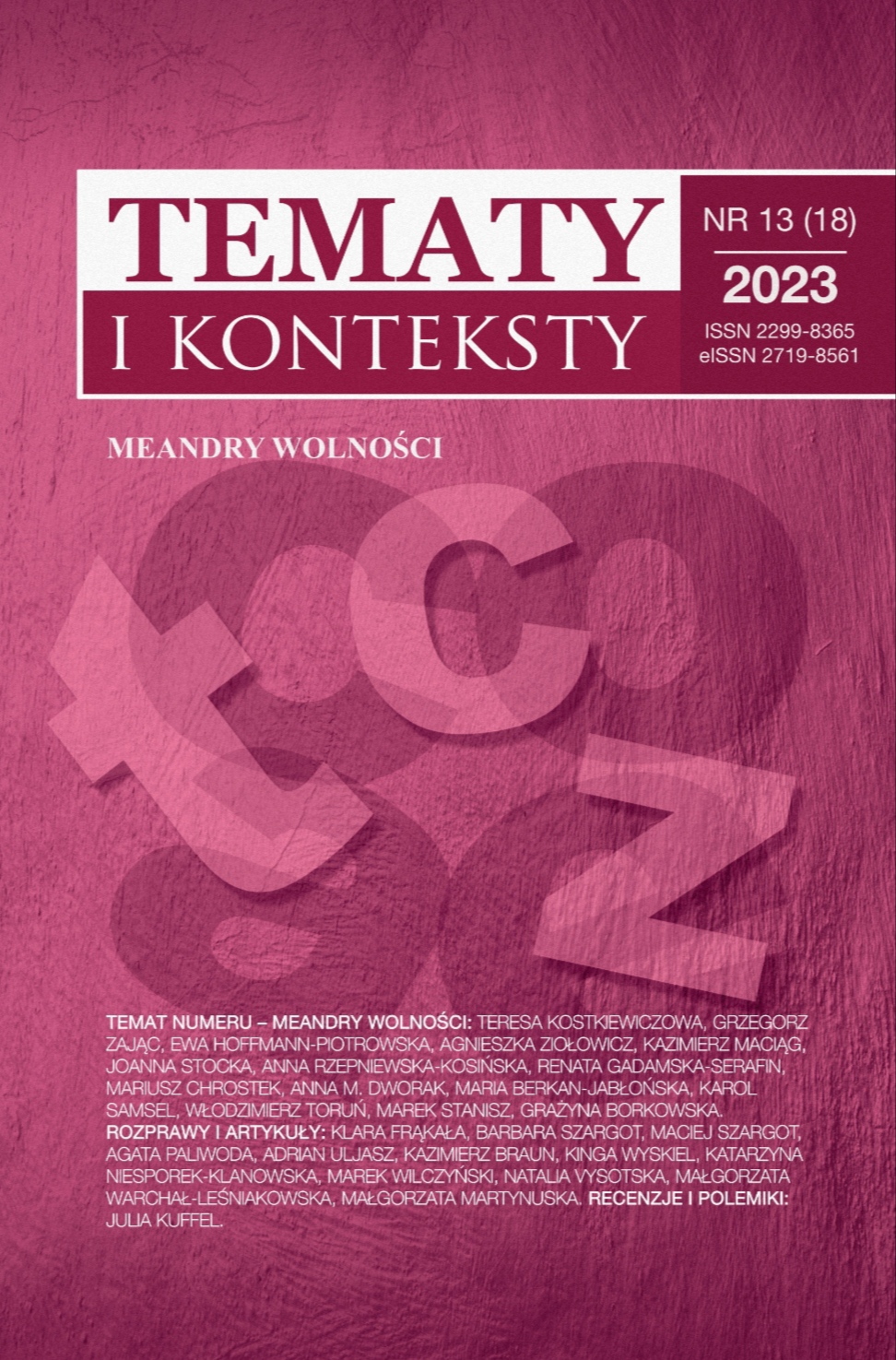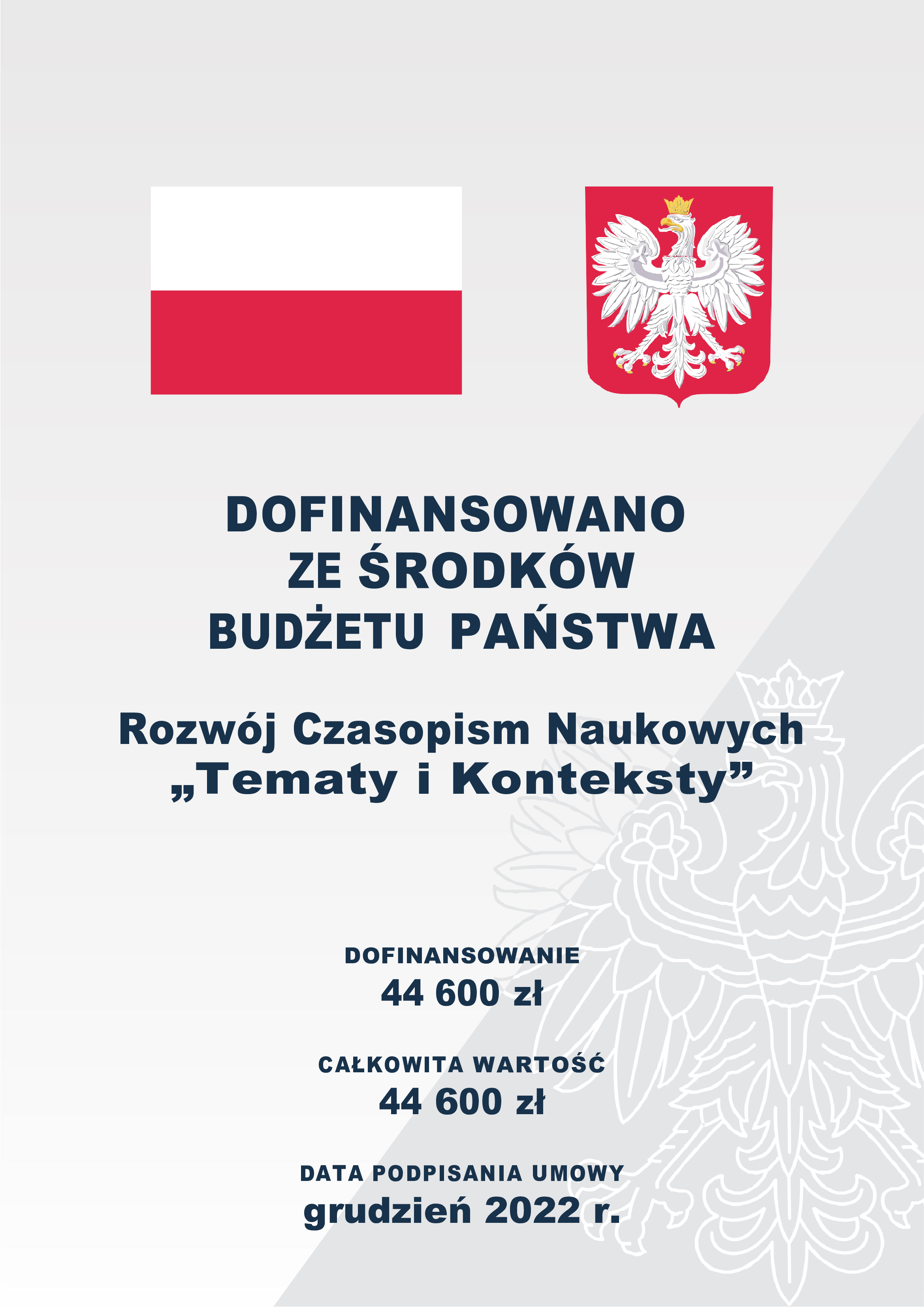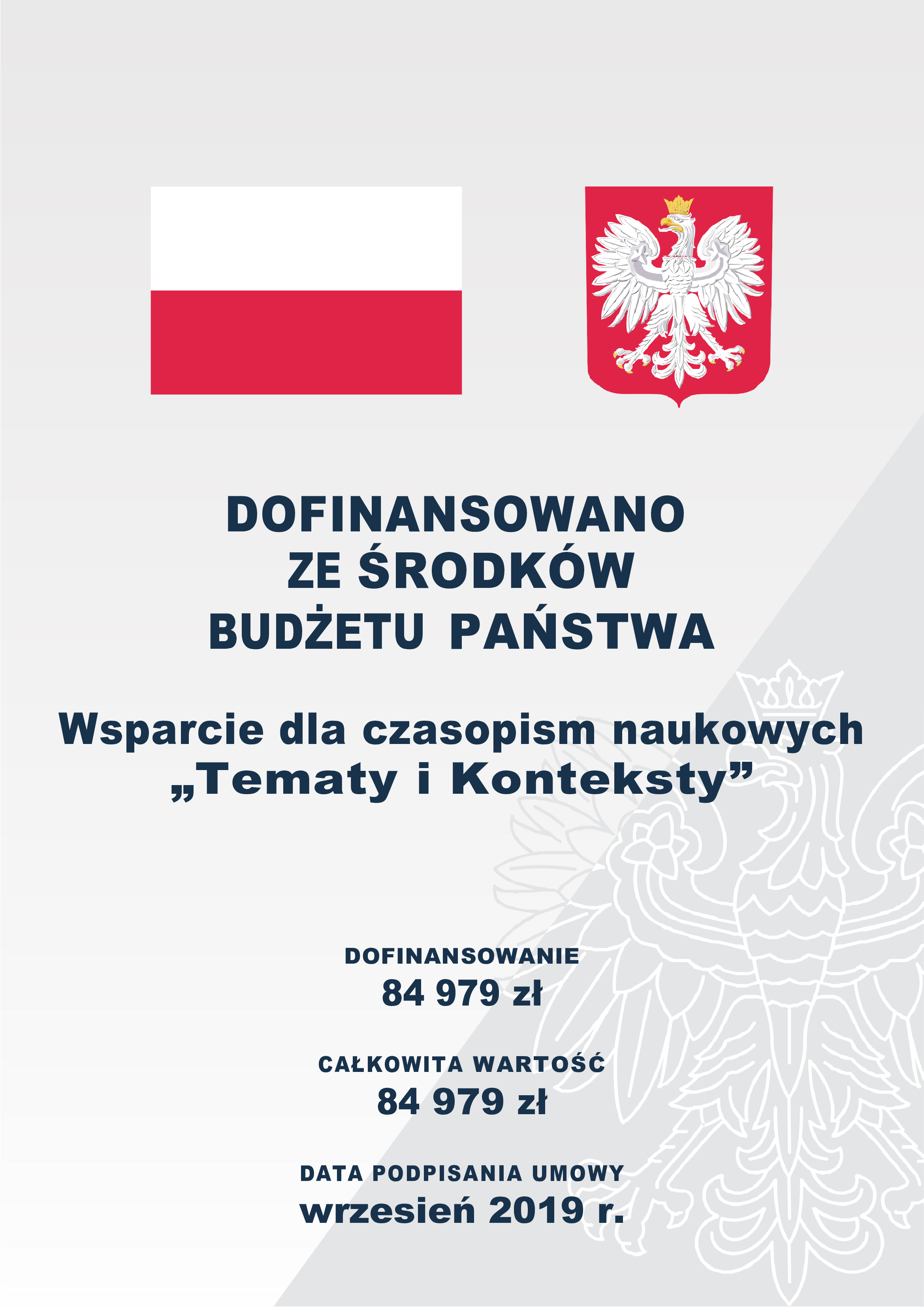Between Nature and Civilization(s): American Wilderness as a Eurocentric Cultural Construct in Tony Morrison’s "A Mercy"
DOI:
https://doi.org/10.15584/tik.2023.24Słowa kluczowe:
natura, cywilizacja, Toni Morrison, New Eden, ogród, konstrukt kulturowyAbstrakt
The paper sets out to explore the ways the traditional Western opposition “nature vs. civilization” is reworked in Toni Morrison’s A Mercy. The first aspect addressed in the paper is the author’s recasting of the original Puritan myth of America as New Eden by demonstrating the historical impossibility of human-nature and human-human harmony on the “new” continent. This is achieved through presenting Jacob Vaark’s New England farm as a metaphor of Eden/enclosed garden transmogrifying from Utopian to Dystopian mode of functioning in the text, with apparent ecofeminist overtones.The second issue dealt with is “wilderness” as one of the basic concepts underlying American Puritan world picture. The paper argues that in the novel “wilderness” as an inherent characteristic of England’s transatlantic territorial expanses, including both their physical and human resources, loses its essentialism and is unmasked as a Eurocentric cultural construct. In addition, the novel extends the notion of “civilization” beyond its Eurocentric boundaries featuring two non-European civilizations – Native American and African – as suggesting alternative (and much more positive) models of “nature-civilization” relationship.
Downloads
Bibliografia
Aquinas, T. “Treatise on Man” [in] Summa Theologica. https://www.ccel.org/a/aquinas/summa/FP/FP075.html#FPQ75OUTP1
Bercovitch, S. The Puritan Origins of the American Self. New Haven & London: Yale University Press, 1975.
Bernheimer, R. Wild Man in the Middle Ages: A Study in Art, Sentiment, and Demonology. Harvard University Press, 1952.
Callicott, J. B., Nelson, M. P. “Introduction” [in] Callicott, J.B. & M.P. Nelson (eds) The Great New Wilderness Debate. The University of Georgia Press, 1998, pp. 1-20.
Clark, B. Eugene O’Neill. The Man and His Plays. Dover Publications, 1947.
Cronon, W. “The trouble with wilderness; or, getting back to the wrong nature” [in] W. Cronon, ed., Uncommon ground: rethinking the human place in nature. W. Norton & Co., 1996, pp. 69-90.
Danforth, S. A Brief Recognition of New-Englands Errand into the Wilderness. Cambridge, Massachusetts. An Online Electronic Text Edition, 1670. http://greatawakeningdocumentary.com/items/show/9
Fernández-Llamazares, A., Terraube, J., Gavin, M.C., Pyhälä, A., Siani S.M.O., Cabeza, M., Brondizio, E.S. “Reframing the Wilderness Concept Can Bolster Collaborative Conservation”. Science and Society, 2020, Vol. 35, Issue 9, pp. 750-753.
Gaard, G. “Ecofeminism Revisited”. Feminist Formations. 2011, Vol. 23 (summer), pp. 26-53. https://www.academia.edu/2606383/Ecofeminism_Revisited
Hammond, J. Leah and Rachel, or the Two Fruitfull Sisters Virginia and Maryland. Virtual Jamestown, 1656, http://www.virtualjamestown.org/exist/cocoon/jamestown/fha/J1026
Henberg, M. “Wilderness, Myth, and American Character”. The Key Reporter 59 (3), 1994. Spring, pp. 7-11.
Marx, L.. The Machine in the Garden: Technology and the Pastoral Ideal in America. Oxford University Press, 1964/2000.
Merchant, C. “Perspectives on Ecofeminism”, Environmental Action, Summer, 1992, pp. 18-19.
Morrison, T. A Mercy. New York: Alfred A. Knopf. 2008.
Nash, R. Wilderness and the American Mind. 5th ed. Yale University Press, 2014.
Nelson, M. P. & Callicott, J. B. “Introduction: The Growth of Wilderness Seeds” [in] M.P. Nelson & J.B. Callicott (eds) The Wilderness Debate Rages On: Continuing the Great New Wilderness Debate. The University of Georgia Press, 2008, pp. 1-15.
Organ, J. F., Dizard J. E. “Wilderness in the 21st Century: Problem or Opportunity?”, 2010. https://www.researchgate.net/publication/277720477_Wilderness_in_the_21st_century_Problem_or_opportunity
Peterson, J. B. “Eco-Critical Focal Points: Narrative Structure and Environmentalist Perspectives in Morrison’s A Mercy” [in] S. Stave, J. Tally (eds) Tony Morrison’s A Mercy: Critical Approaches. Cambridge Scholars Publishing, 2011.
Plumwood, V. Feminism and the Mastery of Nature, Routledge, 1993.
Showalter, E. “Feminist Criticism in the Wilderness”. Critical Inquiry, 1981, Vol. 8, No. 2, Writing and Sexual Difference (Winter), pp. 179- 205. http://www.jstor.org/stable/1343159
Smith, H. N. Virgin Land: The American West as Symbol and Myth. Harvard University Press, 1950. http://xroads.virginia.edu/~Hyper/HNS/chap11.html
Standing Bear, L. “Indian Wisdom” [in] Callicott, J.B. & M.P. Nelson (eds) The Great New Wilderness Debate. The University of Georgia Press, 1933/1998, pp. 201-206.
Stave, S. A. & Tally, J. “Introduction” [in] S. Stave, J. Tally (eds) Tony Morrison’s A Mercy: Critical Approaches. Cambridge Scholars Publishing, 2011.
Stegner, W. “The Wilderness Idea” [in] D. Brower (ed), Wilderness: America’s Living Heritage. Sierra Club Books, 1961, pp. 95-98.
Taylor, C. “The Politics of Recognition” [in:] Goldberg D.T. (ed.) Multiculturalism: A Critical Reader. 1994, pp. 75-106.
Thompson, C. “Back to Nature? Resurrecting Ecofeminism after Post-structuralist and Third-Wave Feminisms.”. Isis, 97(3), 2006, pp. 505-512
Tocqueville, de, A. Democracy in America. Book II. Chapter XIV, 1840. https://www.marxists.org/reference/archive/de-tocqueville/democracy-america/ch30.htm
White, H. “The Forms of Wildness Archeology of an Idea” [in] E. Dudley, M.E. Novak (eds) The Wild Man Within: An Image in Western Thought from the Renaissance to Romanticism. University of Pittsburgh Press, 1972, pp. 3-38.
Wigglesworth, M. God’s Controversy with New-England, 1662/1871. https://digitalcommons.unl.edu/cgi/viewcontent.cgi?article=1036&context=etas
THE WILDERNESS ACT Public Law 88-577 (16 U.S.C. 1131-1136) 88th Congress, Second Session September 3, 1964 (As amended) https://www.fs.usda.gov/Internet/FSE_DOCUMENTS/fseprd645666.pdf
Pobrania
Opublikowane
Jak cytować
Numer
Dział
Kategorie
Licencja
Prawa autorskie (c) 2023 Tematy i Konteksty

Utwór dostępny jest na licencji Creative Commons Uznanie autorstwa – Użycie niekomercyjne – Bez utworów zależnych 4.0 Międzynarodowe.




